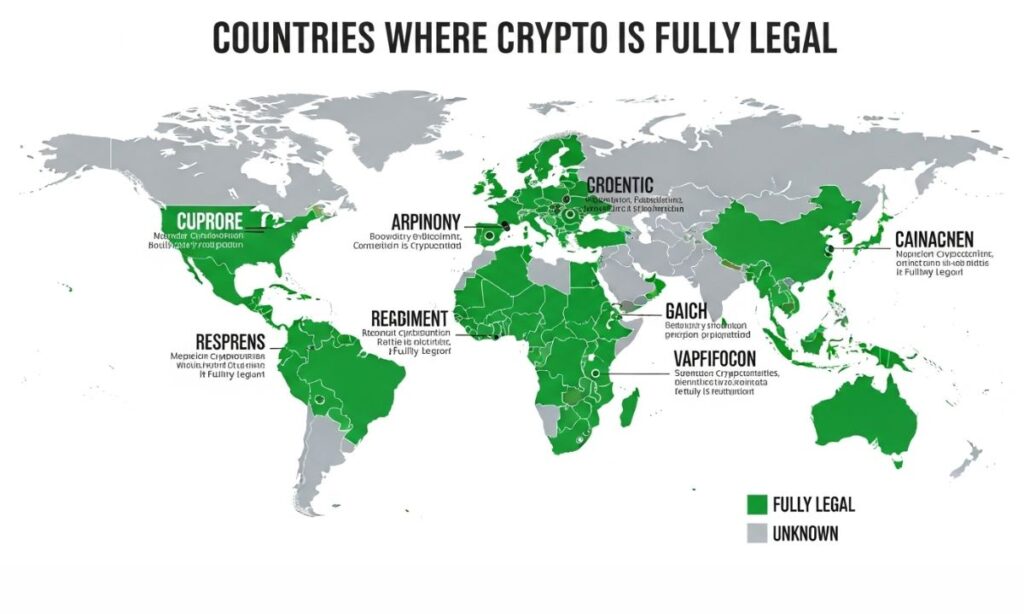Digital currencies face different rules around the world. Every country has its own way of handling crypto. Some welcome it with open arms. Others ban it completely.
Knowing these rules helps traders stay safe. It also helps businesses make smart choices. Laws change fast in this space. What’s legal today might not be tomorrow.
Global Legal Status Overview
Right now, 45 countries say crypto is totally fine. Another 20 have some limits but don’t ban it. Only 10 countries have said no to all digital money.
Most governments are still figuring things out. They want to protect people but not kill innovation. This creates a mixed bag of rules worldwide.
Some places love blockchain technology. They see it as the future of money. Others worry about crime and market crashes.
The picture keeps changing every month. New laws pop up regularly. Old rules get updated or thrown out.
READ THIS BLOG : Best Tools for Resume Writing and Email Automation 2025
Countries Where Crypto is Fully Legal
Germany leads the way in Europe. They have clear rules that make sense. Businesses know what they can and can’t do.
Canada also does things right. They protect consumers without being too harsh. Their system works well for everyone.

Japan has been crypto-friendly for years. They require licenses for exchanges. This keeps scammers away while helping real businesses grow.
Switzerland calls itself “Crypto Valley.” They welcome blockchain companies. Their laws are simple and fair.
These countries show how good rules can work. They balance freedom with safety.
Countries with Partial Crypto Bans
India sits in the middle ground. People can trade crypto but can’t use it to buy things. It’s a weird setup that confuses many.
Russia allows holding crypto but bans payments. You can own Bitcoin but can’t buy coffee with it. Mining also faces limits now.
Thailand lets people trade on licensed exchanges. But using crypto for daily purchases isn’t allowed. Banks also can’t touch digital money.
Many Middle Eastern countries follow similar paths. They allow some activities while blocking others.
Countries with Complete Crypto Bans
China leads the “no crypto” club. They banned everything – trading, mining, even talking about it online. Their stance is crystal clear.
Bangladesh, Bolivia, and Algeria also say no to all crypto. They treat it like illegal drugs. Getting caught can mean serious trouble.
Nepal and North Korea have zero tolerance too. Their governments see crypto as a threat to their control.
These countries worry about losing control of money. They prefer old-school banking systems they can watch closely.
Legal Tender Status Worldwide
Very few places accept crypto as real money. Only Central African Republic does this officially right now.
El Salvador used to accept Bitcoin as money. But they changed their mind in February 2025. Political pressure played a big role.
Most countries keep their own money separate from crypto. They see digital coins as investments, not currency.
Don’t expect many places to make crypto official money soon. Governments like controlling their currencies too much.
United States Crypto Regulations
America has complicated rules that spread across many agencies. The SEC handles some parts. The CFTC handles others. Treasury gets involved too.
Bitcoin is clearly legal there. Other coins face more questions. Whether something is a security or commodity matters a lot.
Different states have different rules too. Wyoming loves crypto. New York makes it harder. This creates a patchwork of laws.
People are pushing for clearer national rules. But politics makes this slow and messy.
European Union Crypto Framework
Europe created MiCA rules that work across all member countries. This makes things simpler for businesses operating there.
The rules cover licensing, operations, and consumer protection. Companies know what’s expected of them.
Individual countries can add their own touches. But the basic framework stays the same everywhere.
This unified approach helps Europe compete with other regions. It also protects regular people from scams.
Asia-Pacific Crypto Policies
Singapore built itself into a crypto hub. Their rules are clear and business-friendly. Many companies set up shop there.
Hong Kong recently opened its doors wider too. They want to compete with Singapore for crypto business.
South Korea focuses heavily on tracking everything. They want to stop money laundering and tax evasion.
Australia is still working on final rules. They’re taking their time to get things right.
Recent Legal Changes in 2025
El Salvador dropping Bitcoin as official money shocked everyone. This happened because of political and economic pressure.
Many countries updated rules for staking and DeFi. These new technologies created legal gray areas that needed fixing.

Tax rules got clearer in several places. Governments want their share of crypto profits.
New licensing requirements popped up in multiple countries. This helps separate legitimate businesses from scammers.
READ THIS BLOG : Authentic Indonesian Street Food Recipes: Easy Traditional Dishes You Can Make at Home
Future Regulatory Trends
Expect more countries to create clear rules rather than ban crypto completely. The technology isn’t going away.
Central bank digital currencies might change everything. When governments make their own crypto, private coins might face new challenges.
International cooperation is growing. Countries are sharing ideas about what works and what doesn’t.
The wild west days of crypto are ending. More rules are coming, but they’ll probably be fair ones.
FAQS
What countries allow cryptocurrency in 2025?
About 45 countries fully allow crypto, including Germany, Canada, Japan, and Switzerland with clear rules.
Which countries have banned cryptocurrency completely?
China, Bangladesh, Bolivia, Algeria, Nepal, and North Korea ban all crypto activities completely.
Is Bitcoin legal tender anywhere in 2025?
Only Central African Republic treats crypto as real money after El Salvador changed its mind in early 2025.
How does the US regulate cryptocurrency?
Multiple agencies share control – SEC, CFTC, and Treasury all have different roles in watching crypto markets.
What is the EU’s stance on cryptocurrency?
Europe created MiCA rules that work across all member countries, balancing business growth with consumer protection.
Conclusion
Crypto laws vary wildly around the world in 2025. Some countries embrace digital money fully. Others ban it completely. Most sit somewhere in between.
The trend points toward more regulation, not less. But these rules will likely be reasonable rather than punishing. Countries that ban crypto completely might change their minds as the technology proves itself.
Smart crypto users stay informed about local laws. They also prepare for changes that might affect their holdings. The regulatory landscape will keep evolving as governments learn more about this new technology

